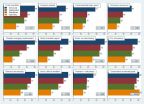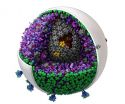Unlike people, monkeys aren't fooled by expensive brands
2014-12-02
(Press-News.org) In at least one respect, Capuchin monkeys are smarter than humans -- they don't assume a higher price tag means better quality, according to a new Yale study appearing in the open-access journal Frontiers in Psychology.
People consistently tend to confuse the price of a good with its quality. For instance, one study showed that people think a wine labeled with an expensive price tag tastes better than the same wine labeled with a cheaper price tag. In other studies, people thought a painkiller worked better when they paid a higher price for it.
The Yale study shows that monkeys don't buy that premise, although they share other irrational behaviors with their human relatives.
"We know that capuchin monkeys share a number of our own economic biases. Our previous work has shown that monkeys are loss-averse, irrational when it comes to dealing with risk, and even prone to rationalizing their own decisions, just like humans," said Laurie Santos, a psychologist at Yale University and senior author of the study. "But this is one of the first domains we've tested in which monkeys show more rational behavior than humans do."
Rhia Catapano, a former Yale undergraduate who ran the study as part of her senior honors thesis, along with Santos and colleagues designed a series of four experiments to test whether capuchins would prefer higher-priced but equivalent items. They taught monkeys to make choices in an experimental market and to buy novel foods at different prices. Control studies showed that monkeys understood the differences in price between the foods. But when the researchers tested whether monkeys preferred the taste of the higher-priced goods, they were surprised to find that the monkeys didn't show the same bias as humans.
Santos and colleagues think that differences in the response of humans and capuchins could stem from the different experiences that monkeys and people have with markets and how they behave.
"For humans, higher price tags often signal that other people like a particular good." Santos noted. "Our richer social experiences with markets might be the very thing that leads us -- and not monkeys -- astray in this case."
INFORMATION:
ELSE PRESS RELEASES FROM THIS DATE:
2014-12-02
Irvine, Calif., Dec. 2, 2014 - A comprehensive, 21-year analysis of the fastest-melting region of Antarctica has found that the melt rate of glaciers there has tripled during the last decade.
The glaciers in the Amundsen Sea Embayment in West Antarctica are hemorrhaging ice faster than any other part of Antarctica and are the most significant Antarctic contributors to sea level rise. This study is the first to evaluate and reconcile observations from four different measurement techniques to produce an authoritative estimate of the amount and the rate of loss over the ...
2014-12-02
ARGONNE, Ill. ― A team of researchers from the U.S. Department of Energy's Argonne National Laboratory and Ohio University have devised a powerful technique that simultaneously resolves the chemical characterization and topography of nanoscale materials down to the height of a single atom.
The technique combines synchrotron X-rays (SX) and scanning tunneling microscopy (STM). In experiments, the researchers used SX as a probe and a nanofabricated smart tip of a STM as a detector.
Using this technique, researchers detected the chemical fingerprint of individual ...
2014-12-02
West Orange, NJ. December 2, 2014. Stroke researchers have found that the presence of frontal lesions predicts better functional improvement in individuals with spatial neglect who received prism adaptation therapy. "Integrity of medial temporal structures may predict better improvement of spatial neglect with prism adaptation treatment" (doi: 10.1007/s11682-012-9200-5) was published in September in the Neuroimaging and Rehabilitation Special Issue of Brain Imaging & Behavior. The authors are Peii Chen, PhD, Priyanka Shah, and A.M. Barrett, MD, of Kessler Foundation, Kelly ...
2014-12-02
To arrange for an interview with a researcher, please contact the Communications staff member identified at the end of each tip. For more information on ORNL and its research and development activities, please refer to one of our media contacts. If you have a general media-related question or comment, you can send it to news@ornl.gov.
IMAGING - Clearer brain scans ...
A clever signal noise reduction strategy developed by a team that includes Oak Ridge National Laboratory's Ben Lawrie could dramatically improve brain imaging. By using quantum correlated beams of light, ...
2014-12-02
New Rochelle, NY, December 2, 2014--A study of active duty U.S. Marines who suffered a recent or previous concussion(s) examined whether persistent post-concussive symptoms (PPCS) and lingering effects on cognitive function are due to concussion-related brain trauma or emotional distress. The results are different for a recent concussion compared to a history of multiple concussions, according to the study published in Journal of Neurotrauma, a peer-reviewed journal from Mary Ann Liebert, Inc., publishers. The article is available Open Access on the Journal of Neurotrauma ...
2014-12-02
DURHAM, N.H. - Environmentalists dispirited by the Republicans' dominance of the recent midterm elections can take heart: non-Tea Party Republicans' views on science and environmental issues are closer to those of Independents than to Tea Party supporters. That's the primary finding of new research by University of New Hampshire sociologists, published this week in the journal Environmental Politics.
"Across a range of science and environmental issues, non-Tea Party Republicans are more similar to Independents than they are to Tea Party supporters, and those divisions ...
2014-12-02
Witnessing violence by parents or a parent's intimate partner can trigger a chain of negative behaviors in some children that follows them from preschool to kindergarten and beyond, according to researchers at Case Western Reserve University.
But girls and boys can be affected differently, researchers concluded. While girls tend to internalize their exposure to such violence, boys are more inclined to act out aggressively, said Megan R. Holmes, PhD, MSW, assistant professor at the Jack, Joseph and Morton Mandel School of Applied Social Sciences at Case Western Reserve ...
2014-12-02
The Valle de Aguán spiny-tailed iguana is a critically endangered species found in Honduras. A recent survey of people living in the region shows that, although residents are aware of the endangered status of the species, the iguana continues to be hunted for food. Of particular concern is the preference for the consumption of female iguanas that are gravid (carrying eggs in their body).
"In this study we worked to gain a better understanding of how humans are harvesting the species for food," said Stesha Pasachnik, Ph.D., a lead researcher on the study and ...
2014-12-02
LA JOLLA, CA - December 1, 2014 - Researchers can now explore viruses, bacteria and components of the human body in more detail than ever before with software developed at The Scripps Research Institute (TSRI).
In a study published December 1 in the journal Nature Methods, the researchers demonstrated how the software, called cellPACK, can be used to model viruses such as HIV.
"We hope to ultimately increase scientists' ability to target any disease," said Art Olson, professor and Anderson Research Chair at TSRI who is senior author of the new study.
Putting cellPACK ...
2014-12-02
PROVIDENCE, R.I. [Brown University] -- If decades of effort to bring more underrepresented minority students into science, technology, engineering and mathematics (STEM) fields were considered a grand chemistry experiment, then the modest results would suggest that while the formula may not be wrong, it may well be incomplete, according to a new article in the journal CBE-Life Sciences Education.
"I don't necessarily want to say that we've been doing it wrong all along, it's just that there are other ideas we can bring in," said lead author Andrew G.Campbell, a Brown ...
LAST 30 PRESS RELEASES:
[Press-News.org] Unlike people, monkeys aren't fooled by expensive brands



